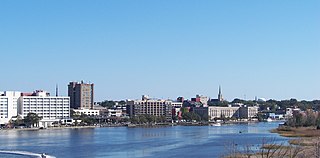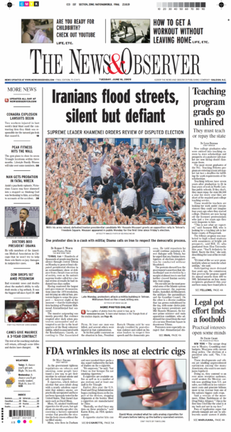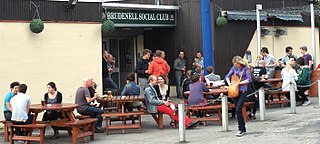
North Carolina is a state in the Southeastern region of the United States. The state is the 28th-largest and 9th-most populous of the United States. It is bordered by Virginia to the north, the Atlantic Ocean to the east, South Carolina to the south, Georgia to the southwest, and Tennessee to the west. Along with South Carolina, it makes up the Carolinas region of the East Coast. In the 2020 census, the state had a population of 10,439,388. Raleigh is the state's capital and Charlotte is its largest city. The Charlotte metropolitan area, with a population of 2,728,933 in 2020, is the most-populous metropolitan area in North Carolina, the 21st-most populous in the United States, and the largest banking center in the nation after New York City. The Raleigh-Durham-Cary, NC Combined Statistical Area is the second-largest metropolitan area in the state and 32nd-most populous in the United States, with a population of 2,238,315 in 2020, and is home to the largest research park in the United States, Research Triangle Park.

Wilmington is a port city in and the county seat of New Hanover County in coastal southeastern North Carolina, United States. With a population of 115,451 in the 2020 census, it is the eighth-most populous city in the state. Wilmington is the principal city of the Wilmington, NC Metropolitan Statistical Area, which includes New Hanover, Pender, and Brunswick counties in southeastern North Carolina, which had a population of 285,905 in 2020.
The U.S. state of North Carolina is known particularly for its history of old-time music. Many recordings were made in the early 20th century by folk song collector Bascom Lamar Lunsford. Influential North Carolina country musicians like the North Carolina Ramblers and Al Hopkins helped solidify the sound of country music in the late 1920s, while influential bluegrass musicians such as Earl Scruggs and Doc Watson came from North Carolina. Arthur Smith had the first nationally syndicated television program which featured country music. He composed "Guitar Boogie", the all-time best selling guitar instrumental, and "Dueling Banjos", the all-time best selling banjo composition. Country artist Eric Church from the Hickory area, has had multiple No. 1 albums on the Billboard 200, including Chief in 2011. Both North and South Carolina are a hotbed for traditional country blues, especially the style known as the Piedmont blues. Elizabeth Cotten, from Chapel Hill, was active in the American folk music revival.

Josephus Daniels was an American diplomat and newspaper editor from the 1880s until his death, who controlled Raleigh's News & Observer, at the time North Carolina's largest newspaper, for decades. A Democrat, he was appointed by President Woodrow Wilson to serve as Secretary of the Navy during World War I. He became a close friend and supporter of Franklin D. Roosevelt, then Assistant Secretary of the Navy. After Roosevelt was elected President of the United States, he appointed Daniels as his U.S. Ambassador to Mexico, serving from 1933 to 1941. Daniels was a vehement white supremacist and segregationist. Along with Charles Brantley Aycock and Furnifold McLendel Simmons, he was a leading perpetrator of the Wilmington insurrection of 1898.
Charles W. "Charlie" Albertson is an American politician and musician. A Democratic politician from North Carolina, he was a member of the North Carolina Senate, representing the 5th and 10th districts from 1993 until his retirement in 2010. His district included constituents in Duplin, Harnett and Sampson counties. Albertson also served as the Democratic Caucus Secretary from 2005 until 2010. He previously served in the North Carolina House of Representatives from 1989 through 1992. He has earned the nickname "The Singing Senator."

Cameron A. Morrison was an American politician and the 55th governor of the U.S. state of North Carolina from 1921 to 1925.

The News & Observer is an American regional daily newspaper that serves the greater Triangle area based in Raleigh, North Carolina. The paper is the largest in circulation in the state. The paper has been awarded three Pulitzer Prizes; the most recent of which was in 1996 for a series on the health and environmental impact of North Carolina's booming hog industry. The paper was one of the first in the world to launch an online version of the publication, Nando.net in 1994.
The Music of North Dakota has followed general American trends over much of its history, beginning with ragtime and folk music, moving into big band and jazz. With the development of mass media, local artists in North Dakota, as in the rest of the country, saw a rapid loss of opportunity to create, perform, and sell popular music to the regional audience that had previously provided a market. Punk Music is a major genre in the modern youth scene of North Dakota.

Alfred Moore Waddell was an American politician and white supremacist. A member of the Democratic Party, he served as a U.S. representative from North Carolina between 1871 and 1879 and as mayor of Wilmington, North Carolina from 1898 to 1906.
Tremont Music Hall was a music venue located near downtown Charlotte, North Carolina. The name is based on its address 400 West Tremont Ave. Most shows were all-ages, but the venue had a full-service bar that served beer and liquor. The venue opened in 1995, and became one of the premier venues for independent/metal/alternative bands in the Southeast. It closed on December 19, 2015.

The Wilmington insurrection of 1898, also known as the Wilmington massacre of 1898 or the Wilmington coup of 1898, was a coup d'état and a massacre which was carried out by white supremacists in Wilmington, North Carolina, United States, on Thursday, November 10, 1898. The white press in Wilmington originally described the event as a race riot caused by black people. Since the late 20th century and further study, the event has been characterized as a violent overthrow of a duly elected government by a group of white supremacists.

Arrogance is a rock band from Chapel Hill, North Carolina. In the 1970s and early 1980s, they were one of the most popular local bands in the state.

The Brewery was a music venue located on Hillsborough Street in Raleigh, North Carolina. The Brewery was opened in 1983 by Kenny Hobby and later reopened in 2004 by Tom Taylor. The Brewery had long been a stop for up-and-coming touring acts as well as established acts with a somewhat diminished fan base. In 2011 The Brewery officially closed its doors after 28 years and the building was demolished.

The Brudenell Social Club is a live music venue and social club in Hyde Park, Leeds, England. While being a social enterprise, it retains the "community atmosphere of its origins as a working men's club". The club is split into three areas—a 400 capacity concert room, a bar area and games room section and a second 400 capacity concert area, known as the Community Room, which opened in 2017.

Hopscotch Music Festival is an annual three-day music festival in downtown Raleigh, North Carolina, United States. With more than 120 bands, Hopscotch is known for adventurous lineups, memorable performances, and a fan-friendly atmosphere. From large outdoor main stages in Raleigh City Plaza and Red Hat Amphitheater to intimate club shows, the festival features music of many genres—rock, hip-hop, metal, folk, electronic, experimental, and more—and its schedule highlights this diversity each year.
Double Barrel Benefit (DBB), is WKNC-FM's annual fundraiser that provides for two nights of music from local North Carolina based bands. The benefit series was first organized by former General Manager Jamie Procter and held January 4–5, 2004 in Raleigh, North Carolina. The benefit changed locations for the first time in 2008, when the venue changed from Kings Barcade to The Pour House. The concert returned to the newly reopened Kings Barcade in 2011 and then returned to The Pour House in 2012. In 2014, the show split weekends and venues, holding the event at Lincoln Theatre in Raleigh and Cat's Cradle in Carrboro. The event returned to the same weekend and venue in 2017. There was no Double Barrel Benefit show held in 2021, due to the COVID-19 pandemic.
Schoolkids Records is a retail indie record store based in the "Triangle" region of Raleigh-Durham-Chapel Hill, North Carolina.
L Shape Lot is an American band from Wilmington, North Carolina. The band plays Americana/folk rock/roots rock/bluegrass music. They are noted for their four part harmonies, and lively stage show. Since 2006 the band members have been Eric Miller on acoustic Guitar, Alex Lanier on electric and acoustic guitar, Rick Williams on bass, and John Kovalski on drums. All members sing, with Eric Miller taking most lead vocals.

Merrimon-Wynne House, also known as the Merrimon House and Wynne Hall, is a historic home located at Raleigh, Wake County, North Carolina. The house was built about 1875, and is a two-story, four-bay, Italianate style frame dwelling with a cross-gabled roof and somewhat irregular massing. It is sheathed in weatherboard and features a Stick Style / Eastlake movement front porch with abundant ornamentation. The house was remodeled and complementary bay windows added about 1910. The house was built by Senator Augustus Summerfield Merrimon (1830-1892).

The Public Facilities Privacy & Security Act, commonly known as House Bill 2 or HB2, was a North Carolina statute passed in March 2016 and signed into law by Governor Pat McCrory. The bill amended state law to preempt any anti-discrimination ordinances passed by local communities and, controversially, compelled schools and state and local government facilities containing single-gender bathrooms to only allow people of the corresponding sex as listed on their birth certificate to use them; it also gave the state exclusive rights to determine the minimum wage.














